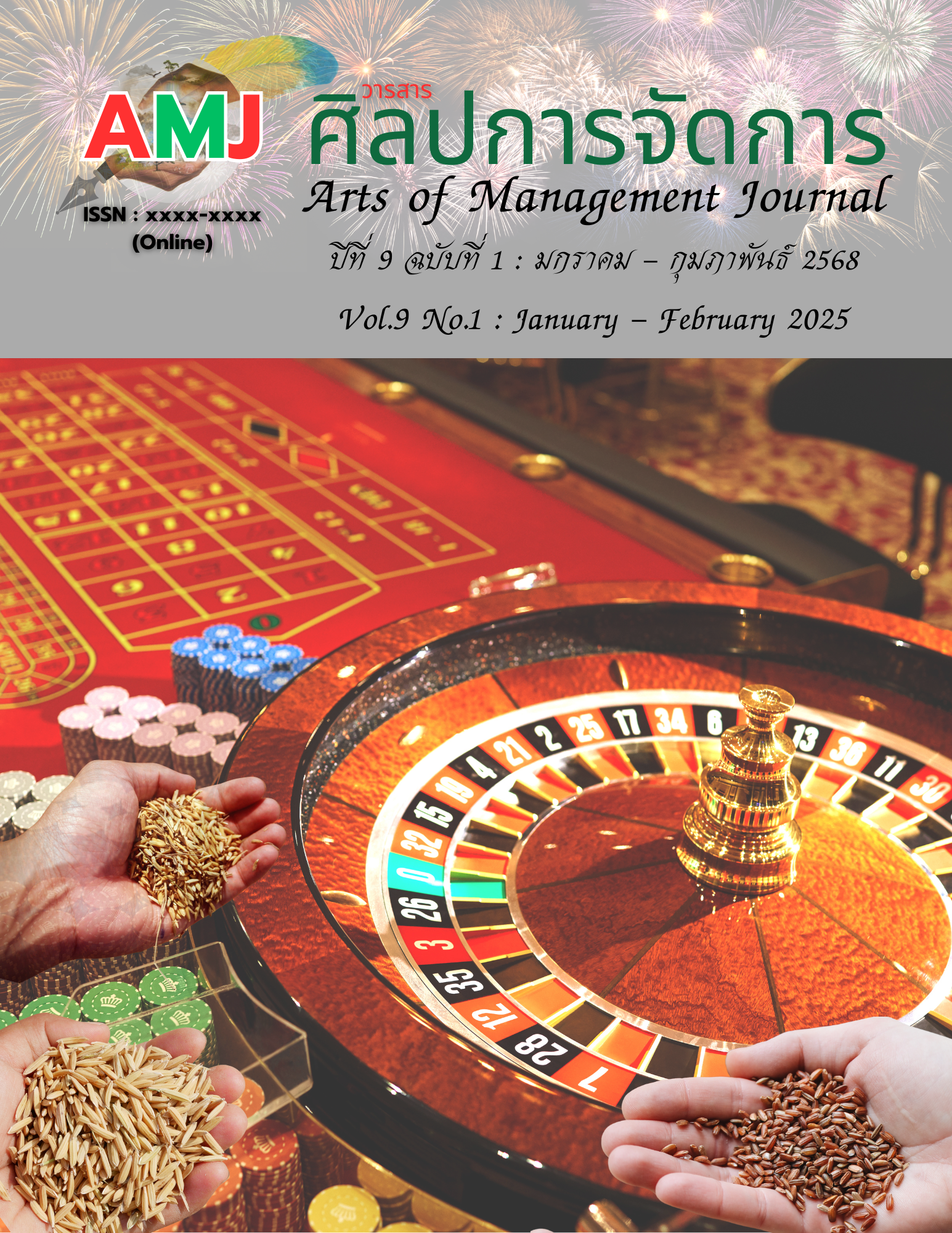Organizational Culture on the Music Teacher Professional Development of Middle School in Guangxi Zhuang Autonomous Region
Main Article Content
Abstract
The purposes of this research were to 1) to study the exploratory factors analysis of the organizational culture on the Music teacher Professional Development of Middle Schools in Guangxi Zhuang Autonomous Region and 2) to propose the guidelines for developing organizational culture on the music teacher professional development of middle school in Guangxi Zhuang Autonomous Region. The sample group in the study was 335 middle schools in Guangxi Zhuang Autonomous Region. The respondents consist of 335 middle school administrators and 335 respondents’ music teachers, totaling 670 respondents using simple random sampling. The research instruments were the semi-structured interview, the opinionnaires, and the checklist form. The data analysis statistics were frequency, percentage, mean, standard deviation, and the exploratory factors analysis of the organizational culture on the Music teacher professional development of the middle school in Guangxi Zhuang Autonomous Region, and the findings were confirmed by content analysis.
The findings of this research were: 1. The exploratory factors analysis of the organizational culture on the Music teacher professional development of the middle school in Guangxi Zhuang Autonomous Region, the results of the research data analysis revealed four factors: 1) academic development pathways, 2) Professional knowledge, and 3) teaching quality of music teachers 4) teachers' professional identity. 2. The four factors derived in organizational culture on the music teacher professional development of the middle school in Guangxi Zhuang Autonomous Region were found to be appropriate, accurate, and following proposing the guidelines for developing organizational culture on the music teacher professional development of the middle school in Guangxi Zhuang Autonomous Region.
Article Details

This work is licensed under a Creative Commons Attribution-NonCommercial-NoDerivatives 4.0 International License.
Views and opinions appearing in articles in the Journal of Arts of Management It is the responsibility of the author of the article. and does not constitute the view and responsibility of the editorial team I agree that the article is copyright of the Arts and Management Journal.
References
Achievers Solutions Inc. (2023). Organizational culture: definition, importance, and development. https://www.achievers.com/blog/organizational-culture-definition/
Bao, J. (2020). The positive impact of music education on the artistic and cultural development of middle school students. International Journal of Music Education, 38(2), 220-234.
Cong, X. (2020). An empirical study on administrative agency integration from the perspective of organizational culture[Doctoral dissertation, Shanghai Normal University].
Denison, D. R., & Mishra, A. K. (1995). Toward a theory of organizational culture and effectiveness. Organizational Science, 6, 204-223. DOI:10.1287/orsc.6.2.204
Fang, M. (2018). The definition and importance of organizational culture within educational institutions. Journal of Educational Administration, 56(4), 500-515.
Hu, Y. (2018). Research on organizational culture construction of H Vocational College[Doctoral dissertation, Guangdong University of Finance and Economics].
Ji, D. (2021). Types and functions of school organizational culture. Teaching and educating people: reference for principals.
Kaiser, H. F. (1960). The application of electronic computers to factor analysis. Educational and Psychological Measurement, 20, 141-151. http://dx.doi.org/10.1177/001316446002000116
Kaiser, M. O. (1974). Kaiser-Meyer-Olkin measure for identity correlation matrix. Journal of the Royal Statistical Society, 52, 296-298.
Liu, F., & Li, T. (2023). Teacher professional development from the perspective of moral education integration. Educational Practice and Research, (30), 33-36.
Ning, F. (2020). The necessity for schools to consider teachers' situations and needs in professional development. Educational Review, 72(3), 380-399.
Stevens, J.P. (2009). Applied multivariate statistics for the social sciences (5th ed.). Routledge.
Sun, H, & Tian, B. (2022). Evaluation leads the professional development of regional teachers. Basic Education Curriculum.
Wang, J. (2020). Role positioning of primary and secondary school music teachers in the new era. Western Quality Education, 6(1), 2.
Wang, M. (2023). Research on the current situation of professional development community for new teachers in compulsory education[Doctoral dissertation, Harbin Normal University].
Wang, Y. (2023). Research on the professional development path of young college teachers. Liaoning Youth, (13), 0058-0060.
Xiao, F. (2018). Exploration of school organizational culture reconstruction based on system change. Primary and Secondary School Management, (3), 3.
Xu, H. (2023). Research on the professional growth path of teachers based on the current situation of teachers' professional development. Teaching and Educating People: New Concepts of Teachers, (5), 47-49.
Yang, F. (2017). Survey and research on the current situation of professional development of middle school music teachers in Xi'an[Doctoral dissertation, Shaanxi Normal University].
Yang, F. (2019). The significance of professional development policies for music teachers. International Journal of New Developments in Education, 5(13), 59-65.
Zhang, J (2019). Research on the relationship between leadership style, organizational culture and error management atmosphere[Doctoral dissertation, Chongqing University of Posts and Telecommunications].
Zhao, D. (2018). Research on the impact of organizational culture on work engagement in colleges and universities[Doctoral dissertation, Shanghai Normal University].
Schein, E. H. (2017). Organizational culture and leadership (5th ed.). Wiley.


